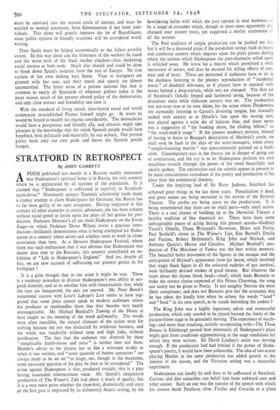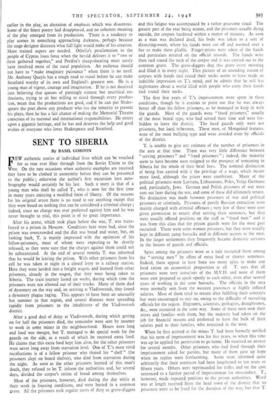STRATFORD IN RETROSPECT
By JOHN GARRETT
APOEM published last month in a Russian weekly announces that Shakespeare's spiritual home is in Russia, the only country where he is appreciated by all sections of the population. It is claimed that "Shakespeare is suffocated in captivity in Stratford- upon-Avon." Nineteenth century Teutonic scholarship made many a clumsy attempt to claim Shakespeare for Germany, but Russia has so far been guilty of no such arrogance. Having surpassed in this century all other countries in artistic adventure, she has been content without racial greed to lavish upon the plays all her genius for pro- duction. Professor Morozov's all too short Shakespeare on the Soviet Stage—to which Professor Dover Wilson wrote a gracious intro- duction—brilliantly demonstrates what is being attempted for Shake- speare in a country where actors and scholars seem to work in closer association than here. At a Moscow Shakespeare Festival, where there was such enthusiasm that it was obvious that Shakespeare was dearer than ever to the Russians, this country contributed an ex- hibition of "Life in Shakespeare's England." And yet, despite all this, we are now accused of suffocating our greatest genius in his birthplace I It is a grim thought that in ohe sense it might be true. There is a tendency nowadays to distrust Shakespeare's own ability to sus- pend disbelief, and so to smother him with fantastication that, while the eyes are banquetted, the ears are starved. Mr. Peter Brook's sensational success with Love's Labour's Lost seems to have sug- gested that some plays cannot speak to modern audiences unless the producer so manhandles them that they become very nearly unrecognisable. Mr. Michael Benthall's Taming of the Shrew at least taught us the meaning of the word gallimaufry. The words were often inaudible, the natural climaxes of the action went for nothing because the eye was distracted by irrelevant business, and the whole was vaudeville without taste and high jinks, without justification. The fact that the audience was diverted by these "inexplicable dumb-shows and noise" is neither here nor there. Hamlet's advice to the players has as fine a relevance to-day as when it was written, and "some quantity of barren spectators" are always ready to be set on "to laugh, too, though in the meantime, some necessary question of the play be then to be considered." The crime against Shakespeare is that, produced straight, this is a play having reasonable entertainment value. Mr. Quayle's imaginative production of The Winter's Tale had about it much of quality, but it is a very moot point whether the close-knit, dramatically told story of the first part is improved by its elaborately Asiatic setting, by the bewildering ballet with which the play opened in near darkness, Cr by a range of costumes which, though in most cases apparently ur.- changed over sixteen years, yet suggested a motley conference of all the nations.
The Pod l tradition of simple production can be pushed too far, but it will be a thousand pities if the pendulum swings back to heavy and cumbrous scenery which imposes upon the plays pauses during which the tension which Shakespeare the poet-dramatist relied upon is whittled away. He wrote for a theatre which permitted a swift succession of scenes, and thus he secured his telling effects of con- trast and of irony. These are jettisoned if audiences have to sit in the darkness listening to the phoney reproduction of "incidental music" of doubtful relevance, or if players have to contend with noises behind a drop-curtain, while sets are changed. The first act of Stratford's Othello limped and lumbered along, because of the disastrous waits while elaborate scenery was set. The production was not even true to its own idiom, for the scene where Desdemona sits outwardly listening to Cassio's diverting tongue, but inwardly racked with anxiety as to Othello's fate upon the tossing seas, was played against a calm sky of halcyon blue, and there never was a suggestion of "the foaming shore, the chiding billow," or "the wind-shak'd surge." If the present tendency persists, instead of having to listen to Banquo's description of Macbeth's castle, we shall soon be back in the days of the actor-managers, when every "temple-haunting martlet " was conscientiously painted on a back- cloth. Contemporary ears in the theatre are in danger of going out of commission, and the cry is to let Shakespeare perform his own matchless miracle through the power of the word beautifully and clearly spoken. The universities and the schools appear at present to be more conscientious custodians of the poetry and production of his plays than the commercial theatres.
Under the inspiring lead of Sir Barry Jackson, Stratford has
achieved great things in the last three years. Parochialism is dead, and great names are being recruited in the service of the Festival Theatre. The profits are being spent on the productions. It is being remembered that there are no small parts—only small actors. There is a real chance of building up at the Memorial Theatre a healthy tradition of fine theatrical art. There have been some unforgettable pieces of acting during this present season—Godfrey Tearle's Othello, Diana Wynyard's Hermione, Helen and Portia, Paul Scofield's clown in The Winter's Tale, Ena Burrell's Emilia and Pauline, Robert Helpmann's King John and Shylock, and Anthony Quayle's Hector and Claudius. Michael Benthall's pro- duction of The Merchant of Venice was the best within memory. The beautiful ballet movement of the figures in the masque and the anticipation of Shylock's appearance from his house, which involved that tragic black figure in all the coloured ruderies of gay carnival, were brilliantly devised strokes of good theatre. But whatever the truth about the rhyme (bred, head,—shed), which leads Bassani° to make the correct choice expected of this Prince Charming, the song can surely not be given to Portia. Is not naughty Nerissa the most likely conspirator, and .does not Bassani° give her the assurance that he has taken the kindly hint when he echoes the words " head " and " bred " in his own speech, as he stands beholding the caskets ?
The King John was a highly ingenious, adroit and resourceful production, which only needed to be played beyond the limits of the picture-frame stage to be genuinely moving. The experience of watch- ing—and more than watching, actively co-operating with—The Three Estates in Edinburgh proved how immensely all Shakespeare's plays might gain from conditions approximating to the stage conditions for which they were written. Sir David Lindsay's satire was moving enough. If the production had had behind it the power of Shake- speare's poetry, it would have been unbearable. The idea of two actors playing Hamlet in the same production has added greatly to the interest of the season, and the Victorian setting was a successful experiment.
Shakespeare can hardly be said then to be suffocated at Stratford. Curious and dire calamities can befall him from awkward cuts and other causes. Such an one was the transfer of the speech with which his creator made Pandarus close Troilus and Cressida to a place
earlier in the play, an alteration of emphasis which was disastrous. Some of the finest poetry had disappeared, and no coherent meaning of the play emerged from its production. There is a tendency to play scenes in something approaching darkness, perhaps because the stage designer distrusts what full light would make of his creation. More trained supers are needed. Othello's proclamation to the people of Cyprus loses force when the herald delivers it to "two or three gathered together," and Perdita's sheep-shearing must surely have involved more of the rural population. An audience should not have to "make imaginary puissance" when there is no need. Mr. Anthony Quayle has a rough road to travel before he can make Stratford worthy of its own and England's greatest son. He is a young man of vigour, courage and imagination. If he is not deceived into believing that queues of pantingly earnest but uncritical en- thusiasts, trying to sit but willing to stand through every produc- tion, mean that the productions are good, and if he can put Shake- speare the poet above any producer who has the temerity to present his plays, then he has a fair chance of making the Memorial Theatre conscious of its national and international responsibilities. He enters upon a gigantic heritage, and he has and deserves the help and good wishes of everyone who loves Shakespeare and Stratford.



































 Previous page
Previous page